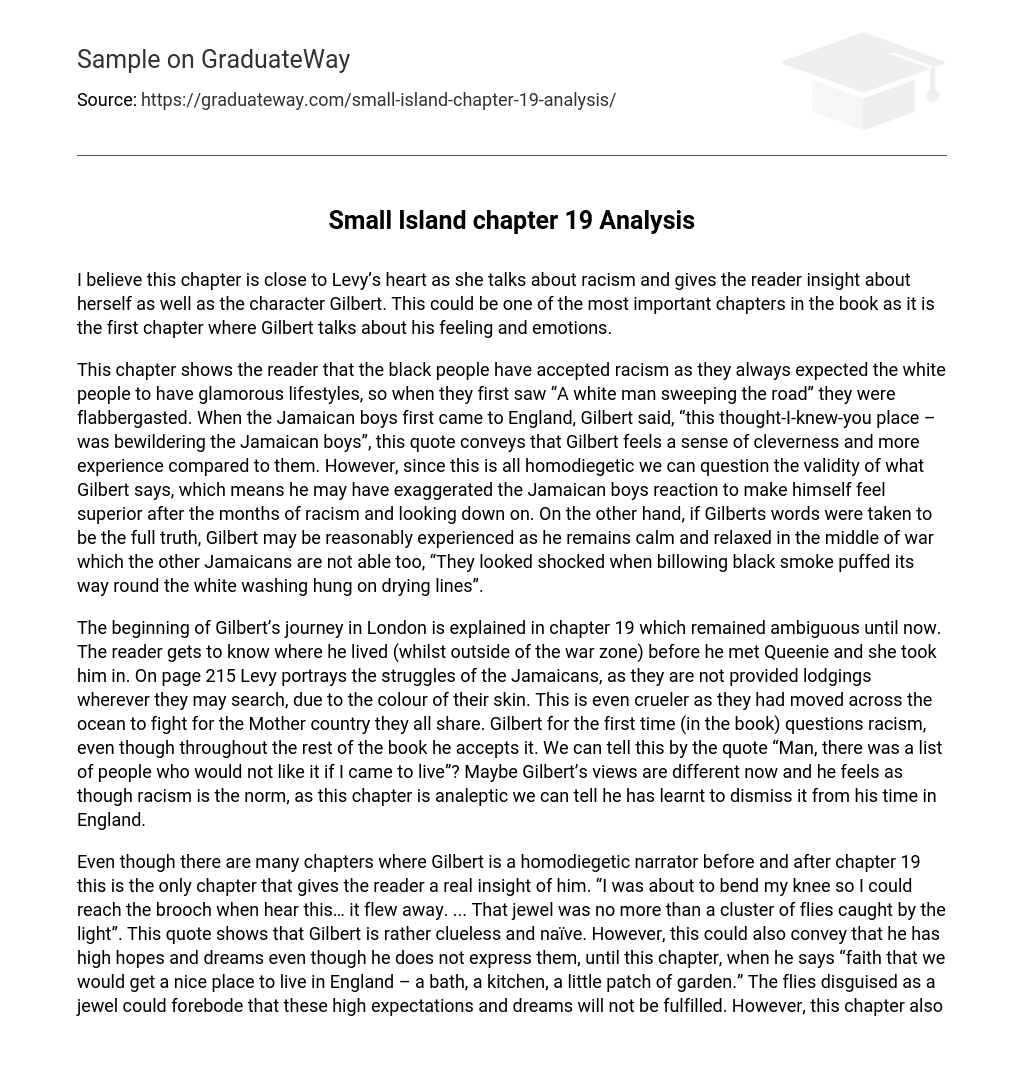I believe this chapter is significant to Levy because she discusses racism and provides insights about herself and the character Gilbert. This chapter could be considered one of the most important in the book as it is the first time Gilbert expresses his emotions and feelings.
This chapter reveals that the black individuals have embraced racism as they always assumed that the white people led luxurious lives. Hence, when they witnessed a white man sweeping the road, they were astonished. Upon arriving in England, the Jamaican boys found themselves bewildered in this unfamiliar place, as Gilbert expressed, “this thought-I-knew-you place”. This quote indicates that Gilbert feels more intelligent and experienced compared to them. However, since Gilbert’s perspective is subjective, we can question the accuracy of his statements. It is possible that he exaggerated the reaction of the Jamaican boys to elevate his own sense of superiority after experiencing months of racism and being looked down upon. Conversely, if we were to accept Gilbert’s words as completely true, he may indeed possess significant experience since he remains composed and relaxed amidst war, unlike the other Jamaicans who are unable to do so. “They looked shocked when billowing black smoke puffed its way round the white washing hung on drying lines”.
Chapter 19 of the book reveals the details of Gilbert’s early days in London, which have been unclear until now. We learn where he lived before being taken in by Queenie. Levy depicts the difficulties faced by Jamaicans in finding accommodations due to their skin color, which is particularly harsh considering they had traveled across the ocean to fight for their shared mother country. This experience prompts Gilbert to question racism for the first time in the book, despite having previously accepted it. This shift can be seen in his statement, “Man, there was a list of people who would not like it if I came to live.” Perhaps Gilbert’s perspective has changed, and he now sees racism as a societal norm. This chapter serves as a flashback, revealing how Gilbert has learned to disregard racism during his time in England.
Despite being a homodiegetic narrator in many chapters before and after chapter 19, it is this particular chapter that truly offers readers an understanding of Gilbert. In this chapter, Gilbert reflects on how he tried to reach a brooch on the floor before it flew away, eventually realizing that it was nothing more than a cluster of flies illuminated by light. This quote suggests that Gilbert is somewhat clueless and innocent, though it can also imply that he harbors hopeful aspirations and dreams. Until this moment, he had not expressed these desires, but in this chapter, he opens up about his faith in finding a better life in England with a comfortable place to live, including a bath, kitchen, and a small garden. The flies disguised as a jewel may symbolize impending disappointment regarding these high expectations and dreams. However, this chapter also highlights Gilbert’s resilience. Despite living in dreadful and cramped conditions, he maintains unwavering faith, which starkly contrasts with Hortense’s attitude of demanding everything immediately upon arriving in London.
The reader can decipher from this chapter that Gilbert has developed strong feelings for Hortense through their letter writing. This is evident when he mentions that Hortense would look pretty with a deep green brooch. Although Gilbert initially considers turning it into the police station, his judgment becomes clouded when he thinks of Hortense, indicating his emotional attachment to her. However, despite his deep love for Hortense, Gilbert encounters some problems with her in chapter 1. In chapter 19, the readers can understand the reasons behind their conflicts. These conflicts create an engaging experience for the reader. In chapter 1, Hortense has high expectations of England and refuses to believe that it is not as glamorous as she imagined, describing it as “shabby in grand sort of way.” Gilbert, on the other hand, does not expect a luxurious lifestyle and understands the need for hard work to achieve success.
The couple differs greatly in their expectations of social status. In chapter 1, Hortense expresses her desire to fit in and appear superior, mirroring her perception of white people: “I straightened my coat… I adjusted my hat.” On the other hand, Gilbert seems more relaxed about racism and doesn’t take it personally. He sees no shame in being dark-skinned and finds humor in everything. It’s possible that this humor serves as a coping mechanism for him, but regardless of the situation, he always manages to find something to laugh about.
Both narratives from the characters, Gilberts and Hortense, are homodiegetic, which raises questions about the validity of their stories and feelings. In addition, chapter 19 in the book is believed to convey a message by Levy. By contrasting Gilberts and Hortense’s characters so distinctly, Levy attempts to highlight the wrongness of racism and encourages white people to actively work towards eliminating prejudice. Prior to this chapter, Gilbert was portrayed as a hot-tempered Jamaican similar to Hortense, but this chapter presents him in a new perspective.
In this chapter, the author discusses the issue of racism and the difficulties faced by Jamaicans. The author also shares their personal thoughts and emotions regarding this topic. Therefore, this chapter holds significant importance for both the author and the reader, as it explores various unanswered questions.





